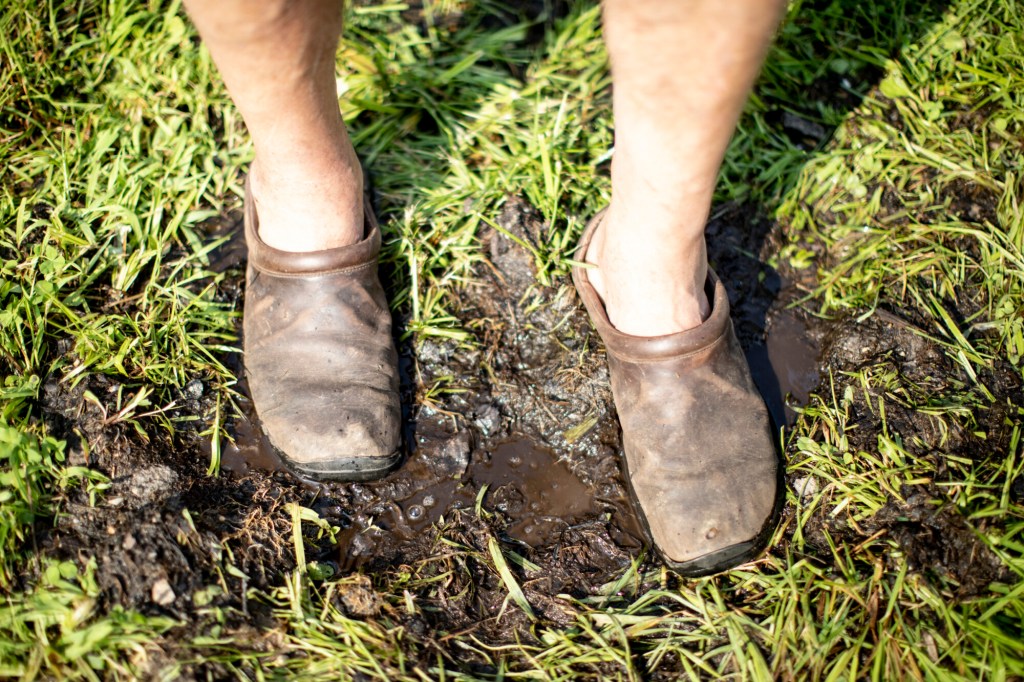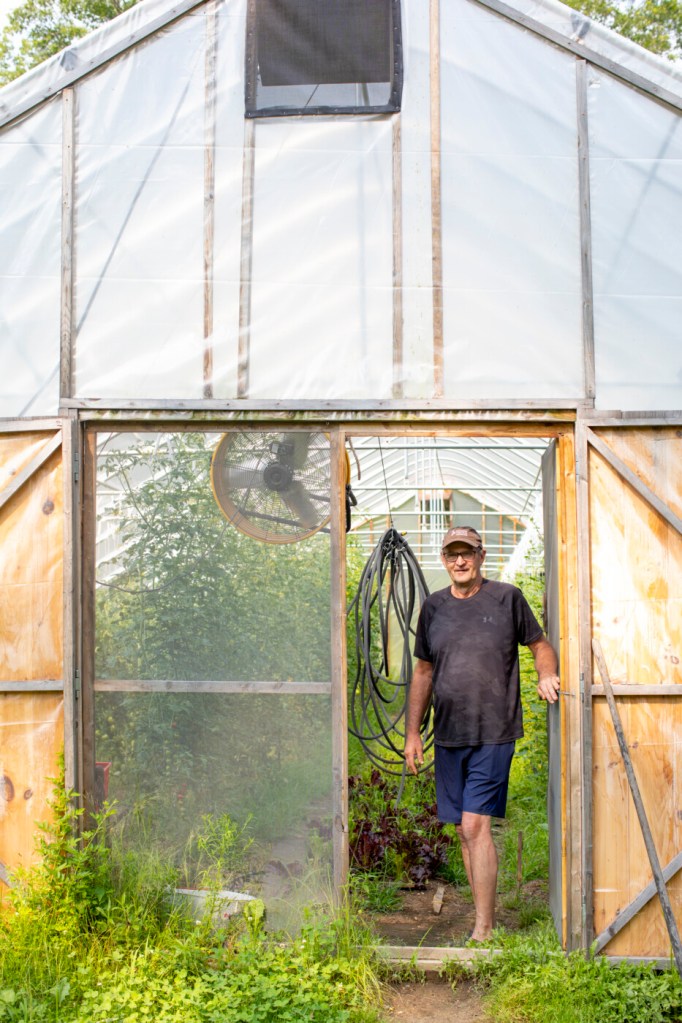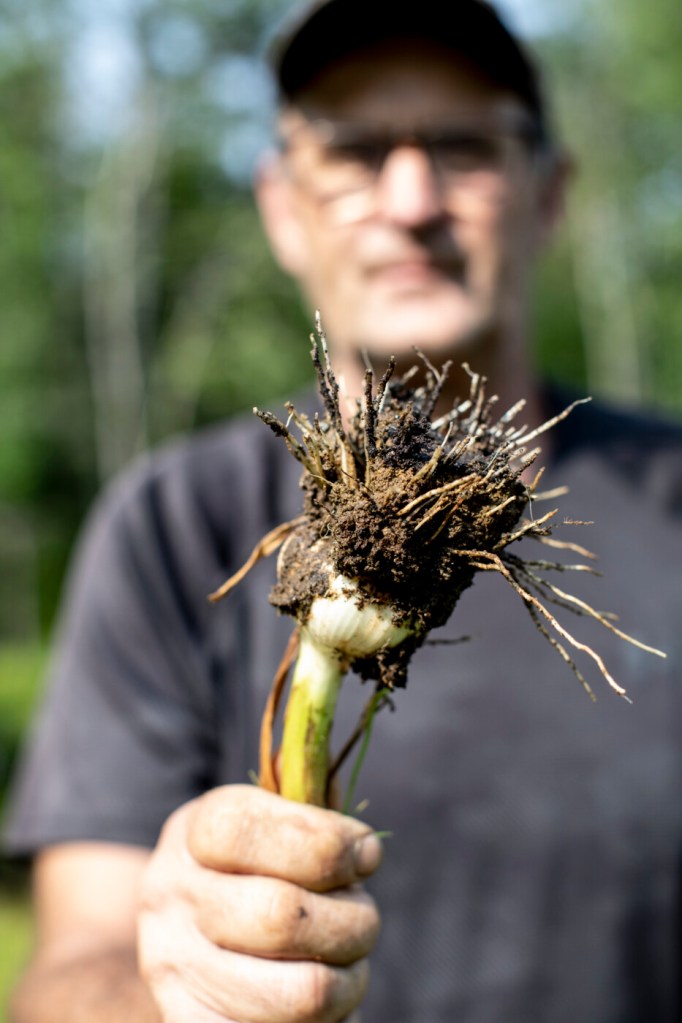BETHEL — Tamara and Vernon Davis of Chapman Brook Farm bought a second greenhouse this year because of all the rain.

Vernon Davis and his wife, Tamara, of Chapman Brook Farm in Bethel bought a second greenhouse because the rain is adversely affecting their outdoor crops. Rose Lincoln/Bethel Citizen
She said this has been the most difficult summer they’ve had. “Looking at the future and how the climate is changing and how little control we have, the greenhouses help you have some control,” she said.
On a walk around their farm they point out how the leaves on the heirloom purple beans have yellowed. “Everything is sitting in muddy soggy soil for a long period of time.” It should be dark green, says Vernon, of the crops planted in neat rows.
Davis said they have noticed their outside crops are about two weeks behind where they should be right now. “Crops that are usually ready are so stunted and stagnant. The weeds, that don’t need as much sun, have surpassed the crops.”
The celery is typically 2.5 feet high by now, they said. The rows currently growing are under a foot high. “These were planted before the ones in the greenhouse,” he says of the beets that are stunted, too.
They lost their outdoor “insurance” cucumbers due to the rain and dampening off of the root, and started more inside under lights, then replanted again. Typically they plant the outdoor cukes in case the greenhouse ones fail due to disease. But this year the opposite happened, the outside ones failed.
The mud was too thick on the garlic not to hose them off. Vernon pulls one from the ground, it is covered in mud that ideally should be one thin layer of dried mud. “When it’s ready, it’s ready… We were harvesting in the pouring rain yesterday,” he said.

The rain is adversely affecting outdoor crops like heirloom purple beans at Chapman Brook Farm. Rose Lincoln
To counter the rain they also purchased a paper pot transplanter. They would have typically put their corn seeds right into the ground, but not when the ground is this wet. The device manually transplants full grown plants into the ground. “That was quite an investment,” said Tamara.
The Greenhouse
While their greenhouse plants are thriving they have to take care inside, too. They try to keep the greenhouse aired out because otherwise bacteria and disease will grow. “A lot of the blights are out in the woods,” said Vern, pointing out one leaf that is rotting. “It’s a fungus. It grows on rotten wood when it’s wet. Then the spores can blow in [to the greenhouse].”
Because they are organic, eradicating the problem is sometimes more complicated. For instance they can’t use insecticides and spray baking soda as a preventative to help with fungus’ or blights that may happen inside the greenhouse.
“Everyday you come out and you’re hoping everything is ok in the greenhouse. Cause if it wasn’t for this greenhouse … ” said Tamara.
The couple’s farm is on Daisy Bryant Road off the North Road. They sell to The Good Food Store, the Good Shephard Food Bank, to Le Ferme and Le Mu and from their own farmstand. They have careers outside of farming. She is a teacher and he is a painter. However together they are passionate about farming, something they have done for many years. They started Chapman Brook Farm about five years ago.

Vernon Davis holds garlic that is so mud-filled that he has to individually hose each one. Rose Lincoln/Bethel Citizen
“We are lucky that we are not relying on this to feed our family. We do it because it is our passion. I feel for the big farmers who are probably experiencing a lot of the same setbacks and losses,” said Davis.
Organic
The couple is certified through Maine Organic Farmer’s and Gardener’s Association or MOFGA and the Real Organic Project. They grow tomatoes, zucchini, beets, carrots, cucumbers, eggplant, broccoli, celery, chard, various lettuces, green beans, kale, sugar snap peas, herbs and corn on about an acre of land. They turn beds over to maximize their space.
“We are holding our breath on the garlic. We produce some high quality garlic. We pulled a couple of testers. I hope I’m surprised because they were so washed out of their nutrients. That’s another problem we’re facing, the leaching of nutrients. [We are] trying to find a window [when it’s not raining] where we can reapply a liquid fertilizer,” said Tamara. She is relieved when they begin to harvest and despite the adverse growing and harvesting conditions, their garlic still produces amazingly big bulbs.
They wonder if other farmers are experiencing the same issues. They know of at least one, their daughter, Bailey Lindgren, who owns Stalk and Pistil [Flower]Farm in Waterford. She had to postpone by a few weeks the CSA’s she typically brings to customers at the Bethel Library.
Tamara Davis said people pull into the driveway looking for carrots that are not ready.
She apologizes and says, “I’m sorry, we need sunshine!”
Send questions/comments to the editors.






